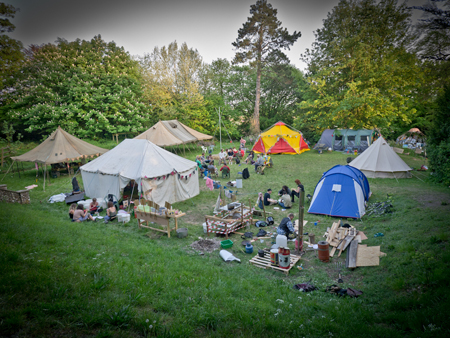This year, Climate Camp set up in my home town of Lewes.
The Climate Camp activists chose an open-field site that has been cordoned off for a number of years – the old St Anne's school grounds, with its derelict building, boarded up, but still standing.
And a fascinating bit of local politics converged with global politics, virtually in my own backyard.
Climate Camp provides the opportunity for environmental activists to self-develop skills and knowledge about activism, practicalities of sustainability and global environmental issues. This is political education at its most basic level: putting your money, voice and body to good purpose – making public concern with climate change visible and establishing a viable, if temporary, low environmental-impact community.
At the Lewes site, local residents were encouraged to take part in creating vegetable and flower beds; a 'Royal Weeding Day'; to help erect some camping essentials; like composting toilets; a 'rocket stove' for keeping a constant hot water supply and various temporary structures and shelters – a big marquee for food, tents (of course) and tripods; and to contribute to various acts of beautification around the site.

The Lewes climate camp
The camp boasts flags and posters and lots of colourful signs, saying things like: 'kid's space', 'tea', 'toilets', and a few huge banners, announcing 'Climate Camp'.
The Camp was expected to last about 10 days, taking in the two bank holiday weekends. The tents were going to be folded today, Monday, 2nd May.
But, as I write, a dozen tents, three marquees and two tripods are still standing, and a group of over twenty Climate Camp activists and local residents are discussing staying on….
The local angle
When the 2011 Climate Camp set up, East Sussex County Council expressed concern about the activists taking over the site, because the old St Anne's school building was considered a hazard and was scheduled for demolition. Interestingly, this doesn't seem to have been public knowledge.
And there is now some question about the motives for the County Council's apparent silence. Is the site to be sold to developers? Will Lewes lose another green space, one that hosts large, well-established deciduous trees, extensive undergrowth, bats and hedgehogs?
Global meets local
The political activism that sparks Climate Camps may be different from the political activism of a local constituency who self-interestedly dispute the selling off of green space. But there is a meeting ground – in this case, a physical space, a 'radical garden', in which purple sprouting broccoli, and political ideas, will grow.
There are already suggestions from local people: that the space be re-claimed for allotments (there is a shortage in the town); or that it be kept 'wild' as an extension of the new South Downs National Park; or that the school building be fixed up as an community eco-arts centre.
The re-claiming of St Anne's school grounds, however, depends on more than just ideas.
Legitimate force: the state keeps 'order'
At the meeting, there was a discussion about the possibility of eviction from the Climate Camp site. Various suggestions for non-violently 'defending the site' were made (barricades, tree houses, etc.). One Climate Camp member, however, noted that if there were a police attempt at eviction, they would, ultimately, go.
Though we live in a democratic society and are able to voice our political opinions, ultimately, the state still holds the right to use 'legitimate force' over the population. We accede to this, for the most part, as the price of order and in exchange for other rights of citizenship.
So, on the 5th May we will hold elections and cast votes in a referendum and the following day, the votes cast will be reflected in the names taking up local council posts and whether the future of voting in Britain will remain the 'first past the post' system or 'AV'.
But what happens when there is no vote – if an issue isn't addressed by the political parties of the day, or if the government retracts its election promises?
Then there is protest, of course. Policed, of course, with 'legitimate force' used against any protesters deemed to be acting against the public interest (illegally).
So a Climate Camp, a group of environmental activists and interested local people, on an abandoned green site, which may hold promise for the County Council for development, is at risk of eviction.
The seeds of local interest have been sown, in the radical garden of environmental activism, but time will tell if the people of Lewes will be able to 'Grow their own future' in the school grounds of St Anne's.
Find out more
The Open University has several modules that address the issues in this article:
- Power, dissent and equality: understanding contemporary politics
- Environment
- Living in a Globalised World
- Earth in Crisis: environmental policy in an international context
In addition, the interdisciplnary Social Sciences module provides an introduction to social science thinking and research.
- This article originally included a YouTube video filmed at Climate Camp which has since been removed from the internet; we've removed the link and replaced it with a link to the Flickr collection of images from the event.
Rate and Review
Rate this article
Review this article
Log into OpenLearn to leave reviews and join in the conversation.
Article reviews
I am also an environmentalist and I am concerned about maintaining a green environment and shores for fisher folks. Well, just like this group of people, I am concerned about the new generation growing up and living without experiencing abundance in nature or clean air. I even published some tips here at (external website removed by OpenLearn Moderator 14.01.15) as a way of telling people to know the status of our nature. I really admire those who are eager to take action on climate change for those who were fed up by an empty government rhetoric and for those who are worried about the future.